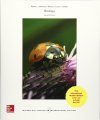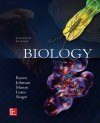About this book
The 11th edition continues the evolution of Raven & Johnson's Biology. The author team is committed to continually improving the text, keeping the student and learning foremost. The integrated pedagogical features expand the students' learning process and enhance their learning experience. This latest edition of the text maintains the clear, accessible, and engaging writing style of past editions with the solid framework of pedagogy that highlights an emphasis on evolution and scientific inquiry that have made this a leading textbook for students majoring in biology. This emphasis on the organizing power of evolution is combined with an integration of the importance of cellular, molecular biology and genomics to offer readers a text that is student friendly and current.
Contents
Part I The Molecular Basis of Life
1 The Science of Biology
2 The Nature of Molecules
3 The Chemical Building Blocks of Life
Part II Biology of the Cell
4 Cell Structure
5 Membranes
6 Energy and Metabolism
7 How Cells Harvest Energy
8 Photosynthesis
9 Cell Communication
10 How Cells Divide
Part III Genetic and Molecular Biology
11 Sexual Reproduction and Meiosis
12 Patterns of Inheritance
13 Chromosomes, Mapping and the Meiosis-Inheritance Connection
14 DNA: The Genetic Material
15 Genes and How They Work
16 Control of Gene Expression
17 Biotechnology
18 Genomics
19 Cellular Mechanisms of Development
Part IV Evolution
20 Genes Within Populations
21 The Evidence for Evolution
22 The Origin of Species
23 Systematics, Phylogenetics, and Comparative Biology
24 Genome Evolution
25 Evolution of Development
Part V Diversity of Life on Earth
26 Origin and Diversity of Life
27 Viruses
28 Prokaryotes
29 Protists
30 Overview of Seedless Plants
31 Overview of Seed Plants
32 Fungi
33 Animal Diversity & the Evolution of Body Plans
34 Protostomes
35 Deuterostomes
Part VI Plant Form and Function
36 Plant Form
37 Transport in Plants
38 Plant Nutrition and Soils
39 Plant Defense Responses
40 Sensory Systems in Plants
41 Plant Reproduction
Part VII Animal Form and Function
42 The Animal Body and Principles of Regulation
43 The Nervous System
44 Sensory Systems
45 The Endocrine System
46 The Musculoskeletal System
47 The Digestive System
48 The Respiratory System
49 The Circulatory System
50 Temperature, Osmotic Regulation and the Urinary System
51 The Immune System
52 The Reproductive Systems
53 Animal Development
Part VIII Ecology and Behavior
54 Behavioral Biology
55 Population Ecology
56 Community Ecology
57 Dynamics of Ecosystems
58 The Biosphere
59 Conservation Biology
Customer Reviews
Biography
Peter H. Raven, Ph.D., is director of the Missouri Botanical Garden and Engelmann professor of botany at Washington University at St. Louis. He oversees the garden's internationally recognized research program in tropical botany – one of the world's most active in the study and conservation of imperiled tropical habitats. Raven's botanical research and work in the area of tropical conservation have earned him numerous honors and awards, including a MacArthur Fellowship. He has written 17 textbooks and more than 400 articles, and he is a member of th National Academy of Science and the National Research Council.
George B. Johnson, Ph.D., is a professor of biology at Washington University in St. Louis and a professor of genetics at the university's School of Medicine. He is a prolific author of life science texts and curriculum products in a variety of media. New to his list of works are the Explorations of Human Biology CD-ROM and the textbook Human Biology, both offered by Wm. C. Brown Publishers. Johnson is acknowledged as an authority on population genetics and evolution variability, and he has published more than 50 research papers dealing with these and related topics. Visitors to the St. Louis Zoo can appreciate Johnson's work in the Living World, the educational center of which he is the founding director.
Kenneth A. Mason received his undergraduate degree in Molecular Biology from the University of Washington, worked at UC Berkeley, then pursued his PhD in Genetics at UC Davis. He has taught Genetics, Microbial Genetics, Microbiology, Advanced Molecular Genetics, Introductory Biology, and a Genetics Laboratory that he designed.
Jonathan Losos is a Monique and Philip Lehner Professor for the Study of Latin America in the Department of Organismic and Evolutionary Biology and Curator of Herpetology at the Museum of Comparative Zoology at Harvard University. Losos's research has focused on studying patterns of adaptive ratiation and evolutionary diversification in lizards. The recipient of several awards including hte prestigious Theodosius Dobzhansky and David Starr Jordan Prizes for outstanding young evolutionary biologists, Losos has published more than 100 scientific articles.
Susan Singer is the Laurence McKinley Gould Professor of the Natural Sciences in teh dpartment of biology at Carleton College in Northfield, Minnesota, where she has taught introductory biology, plant biology, genetics, plant development, and developmental genetics for 20 years. Her research interests are focused on the development and evolution of flowering plants. Singer has authored numberous scientific publications on plant development, contributed chapters to developmental biology texts, and is actively involved with teh education efforts of several professional societies. She received the American Society of Plant Biology's Excellence in Teaching Award, serves on teh National Academies Board on Science Education, and chaired the NRC study committee that produced America's Lab Report.






























